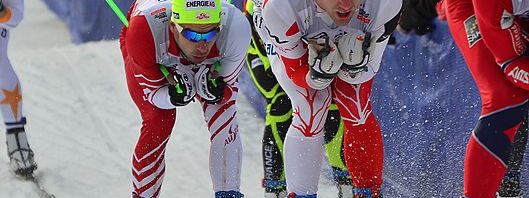NOTE: A summary of the article “Nutrient Intake of Elite Male and Female Nordic Skiers” by Nancy M. Ellsworth, Barbara F. Hewitt, and William L. Haskell.
Summary of Nutrient Intake of Elite Male and Female Nordic Skiers
This study aimed to analyze the dietary intake of elite U.S. Nordic Ski Team members over a year of training and competition. The researchers collected four sets of three-day dietary records from 13 male and 14 female skiers, analyzing their calorie and nutrient intake to determine whether it met recommended dietary guidelines for health and athletic performance.
Methods
The skiers recorded their dietary intake at four intervals throughout the year:
- May (post-season training camp)
- August-September (self-reported intake during training)
- November (pre-season training camp)
- January-February (competition season)
The skiers were trained in recording their intake, and nutritionists provided guidance and verification during training camps. Researchers analyzed daily intake levels of macronutrients (protein, fat, carbohydrates) and key micronutrients (iron, calcium, vitamin C, B vitamins, cholesterol).
Findings
Caloric Intake
- Men consumed between 3,492 to 5,450 kcal/day.
- Women consumed between 2,414 to 3,963 kcal/day.
- Energy intake fluctuated across sessions, with the highest consumption occurring during the most intense training period.
- Compared to recommended caloric needs, their intake was generally sufficient but lower than some previous estimates for endurance athletes.
Macronutrient Intake
- Protein: Both men and women consumed 2-3 times the recommended daily allowance (RDA). Average protein intake was 156g/day for men and 108g/day for women.
- Fat: The skiers’ diet was high in fat, with fat intake accounting for 33.6% to 42.5% of total calories in men and 33.7% to 40.9% in women—well above the recommended 30% limit for athletes.
- Carbohydrates: The diet was lower in carbohydrates than recommended. Carbohydrates provided 39.9% to 51.7% of energy in men and 42.2% to 50.3% in women, whereas endurance athletes should aim for 55-60% of calories from carbohydrates.
- Alcohol: Some alcohol consumption was noted, mostly during group training sessions.
Micronutrient Intake
- Vitamin C, B Vitamins (Thiamine, Riboflavin, Niacin), and Calcium: Intake levels exceeded RDAs for both men and women.
- Iron: While male skiers met or exceeded the RDA of 10 mg/day, most female skiers fell short of the 18 mg/day recommendation, with 36-70% consuming inadequate amounts at different sessions.
- Cholesterol: Intake was excessively high, particularly in men. Their average daily cholesterol intake ranged from 655 mg to 1,210 mg, well above the recommended 300 mg/day limit.
Key Observations
- High Fat, Low Carbohydrate Intake: The athletes’ diets resembled a typical Western diet rather than an ideal endurance athlete’s diet. Fat intake exceeded recommendations, while carbohydrate intake was insufficient for optimal energy availability.
- Training Camp vs. Personal Diet: Surprisingly, skiers consumed less carbohydrate and more fat at training camps than when selecting their own food. This suggests that training camp meal planning could be improved to align better with athletes’ needs.
- Iron Deficiency in Women: The lower iron intake among female skiers raised concerns about potential iron-deficiency anemia, which can negatively impact endurance performance.
- Cholesterol Awareness: Given the high cholesterol levels, the researchers suggested reducing the intake of egg yolks, high-fat meats, and full-fat dairy.
Recommendations
- Increase Carbohydrate Intake: To improve performance, skiers should consume more whole grains, fruits, and starches, ensuring carbohydrates make up at least 55-60% of their diet.
- Reduce Fat Consumption: Limiting dietary fat—especially at training camps—could help achieve a more balanced macronutrient profile.
- Increase Iron Intake for Women: More iron-rich foods (e.g., lean meats, legumes, fortified cereals) or supplementation could prevent iron deficiency and related fatigue.
- Lower Cholesterol Intake: Substituting low-fat dairy and lean proteins for high-cholesterol foods would promote heart health.
Conclusion
The study highlights key nutritional concerns among elite Nordic skiers, including excess fat intake, insufficient carbohydrates, low iron intake in women, and high cholesterol consumption. While overall caloric intake was adequate, the macronutrient distribution did not align with endurance sport recommendations. The findings suggest that nutrition education and meal planning improvements at training camps could help optimize performance and long-term health for elite athletes.

